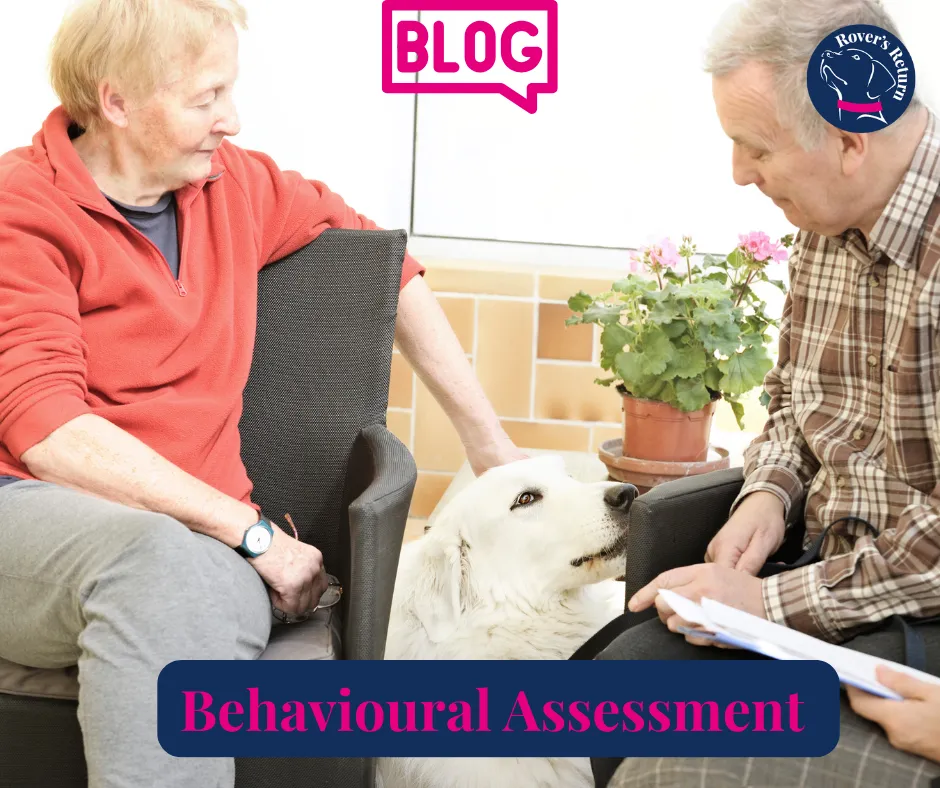Book a FREE 1:1 Assessment Call By Clicking HERE
Specialising In Dog Reactive Behviour
Accredited by APDT, ABTC and UK DOG Behaviour and Training Charter
Qualified and Experienced
Force Free Trainer and Behaviourist
Dog Training Leicestershire Educational Blogs

When Your Dog Needs a Full Behavioural Assessment: A Dog Owner's Guide
When Your Dog Needs a Full Behavioural Assessment: A Dog Owner's Guide

As dog owners, we know our furry companions better than anyone. We can read their subtle cues, anticipate their zoomies, and understand the difference between a happy bark and a "squirrel!" bark. But what happens when their behaviour shifts in a way you can't quite explain?
When the playful pup suddenly seems anxious, or the calm companion starts reacting adversely to people, dogs, or noises?
This is where a full behavioural assessment comes in. It's a crucial step many owners don't even realise is an option.
So, what exactly is a full assessment, why might your dog need one, and why is it so essential for their well-being? Let's dive in.
What Is A Full Behavioural Assessment?
Think of a full assessment as a deep dive into every aspect of your dog's life and health. It's not just a quick check-up at the vet. It's a comprehensive, multi-faceted process that goes beyond a single symptom to uncover the root cause of a behavioural or physical issue.
A full assessment typically involves:
Veterinary Examination: This is the foundational step. A vet will conduct a thorough physical exam to rule out any underlying medical conditions that could be causing the behaviour. Pain, hormonal imbalances, neurological issues, and even allergies can manifest as behavioural problems like aggression, anxiety, or house-soiling.
Behavioural Consultation: This is where a certified animal behaviourist or a vet with a specialisation in behaviour comes in. They will spend time observing your dog, but more importantly, they'll gather an extensive history from you. This includes questions about:
Their early life and socialization.
Daily routine and environment.
Diet and exercise.
Specific triggers for the problem behaviour.
Your own interactions and training methods.
Any recent changes in the household.
Environmental and Lifestyle Review: The assessment often extends to your home and daily routine. Is the dog getting enough mental and physical stimulation? Is their environment a source of stress? Is their diet contributing to the problem?
This holistic view is critical.
Why Might Your Dog Need a Full Assessment?
Understand Your Dog's Behaviour
A full assessment is not for every minor issue. It's typically recommended when you're facing persistent, confusing, or seemingly sudden changes in your dog's behaviour. Here are some of the key reasons a full assessment is warranted:
Sudden or Unexplained Aggression: If your usually gentle dog suddenly starts growling, snapping, or biting, it's a huge red flag. This can be a sign of pain, fear, or a serious medical issue.
Severe Anxiety or Fear: Dogs that exhibit extreme fear of loud noises, separation anxiety, or are constantly on edge may need a deeper look. This can be a debilitating condition that severely impacts their quality of life.
Obsessive-Compulsive Behaviours: Repetitive behaviours like tail-chasing, constant licking, or circling can be a sign of stress, anxiety, or an underlying neurological problem.
House-soiling Issues: If a previously house-trained dog starts having accidents, the first step is always to rule out a urinary tract infection or other medical problem. If the vet finds nothing, a behavioural assessment is the next logical step to look for anxiety or other triggers.
Lethargy or Depression: While this can be a sign of a physical illness, it can also be a symptom of a psychological issue, especially if it's accompanied by a loss of interest in play or food.
When "Standard" Training Fails: You've tried a few training techniques, but nothing seems to work. This is often a sign that you're treating a symptom (the behaviour) without addressing the root cause (the underlying medical or emotional issue).

Why is a Behavioural Assessment Essential?
A full assessment is more than just a diagnostic tool; it's a commitment to your dog's long-term health and happiness. Here’s why it's so essential:
It Gets to the Root Cause: A full assessment prevents you from chasing symptoms. By identifying the root cause—whether it's pain from a hidden injury, fear from a past trauma, or a dietary imbalance—you can develop a truly effective and humane treatment plan.
It Prevents Misdiagnosis: It’s easy to label a dog as "stubborn" or "badly behaved" when, in reality, they might be in pain or suffering from a phobia. A full assessment ensures you don't misdiagnose the problem and, therefore, don't use the wrong solution.
It Improves Your Dog's Quality of Life: By addressing the underlying issue, you can significantly reduce your dog's stress, anxiety, and pain. This leads to a happier, healthier, and more relaxed companion.
It Strengthens Your Bond: The process of a full assessment, with a professional guiding you, can teach you to better understand your dog's needs and communication. This deepens your bond and helps you become a more intuitive and effective owner.
Behavioural analysis is a natural science that studies the behaviour of living organisms, both human and non-human. It is a field with deep roots in psychology and is focused on understanding, explaining, describing, and predicting behaviour based on its relationship with the environment.
Core Principles of Behavioural Analysis
Behavioural analysis is grounded in the philosophy of behaviourism, which posits that behaviour is a product of its circumstances and can be understood through observable events rather than internal, unobservable mental states.
The core principles often revolve around the A-B-C model:
A - Antecedent: What happens immediately before a behaviour occurs. This could be a command, a person, a sound, or a specific object in the environment.
B - Behaviour: The observable action or response of the individual.
C - Consequence: What happens immediately after the behaviour. This is crucial because it influences whether the behaviour is likely to happen again in the future.
The most important principle within this framework is reinforcement, which is a consequence that increases the likelihood of a behaviour occurring again. Reinforcement can be positive (adding something desirable, like praise or a toy) or negative (removing something undesirable, like a chore).
Conversely, punishment is a consequence that decreases the likelihood of a behaviour occurring again, except it rarely does that, punishment suppresses the behaviour. It does nothing to reduce the root causes of the behaviour.
In conclusion, a dog's health is a complex tapestry woven from physical, mental, and emotional threads. When something unravels, a full assessment is the most effective way to mend it. It's an investment in your dog's well-being and a testament to the unconditional love you share. If you're seeing persistent changes in your dog's behaviour, don't hesitate to reach out to your veterinarian and ask about a full assessment. Your best friend will thank you for it.
Sam offers a free consultation call to identify your dog's needs and whether a behavioural assessment is necessary to reduce your dog's behavioural issues.
Highly Qualified Behaviourist
Accredited by APDT, ABTC and UK DOG Behaviour and Training Charter
Accredited Scentwork Instructor
Force Free Trainer and Behaviour
Force Free Trainer and Behaviour
Accredited Scentwork Instructor
Accredited by APDT, ABTC and UK DOG Behaviour and Training Charter
Highly Qualified Behaviourist
Contact Us
Sam: 07725 802995
You can contact us via Live Chat button at the bottom of the screen or the contact box to the right.
You can also book one of our services online using the View Dates buttons under the service you require.
© 2023 by Rovers Return Dog Trainers Academy - Force Free Dog Training Lutterworth, Broughton Astley, Leicestershire, Hinckley, Nuneaton, Stoney Stanton, South Kilworth, Ullesthorpe
Privacy Policy | Terms and Conditions | Terms and Conditions of Services | Sitemap

Facebook
Instagram
X
LinkedIn
Youtube
TikTok